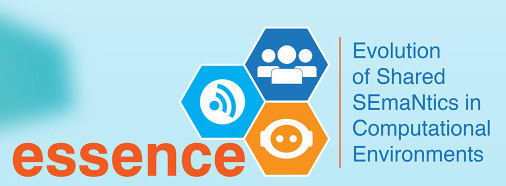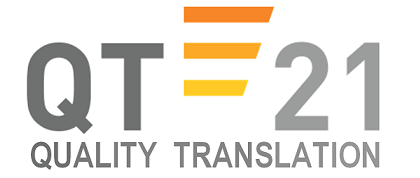The Centre for Communication, Cognition and Computation
joint research centre of UvA and UoE
This page is an overview of current and former research collaborations between the organisations involved in the Centre for Communication, Cognition and Computation.
Current Collaborations
- MECORE: A cross-linguistic investigation of meaning-driven combinatorial restrictions in clausal embedding
- Prof. Mark Steedman (School of Informatics) is currently the Chair of the Scientific Advisory Board of the ILLC
- Ongoing collaboration in the ModUni Project
- Ongoing collaboration between Alistair Isaac and Jakub Szymanik
- Ongoing collaboration between Floris Roelofsen and Wateru Uegaki
- Joint appointment of Ivan Titov (ERC‐grant at UoE, VIDI‐grant at UvA)
- Joint participation in research projects
Former Collaborations
- Collaboration between Keith Stenning and Michiel van Lambalgen
- Dynamic Interpretation of Natural Language (DYANA)
Current Collaborations
MECORE: A cross-linguistic investigation of meaning-driven combinatorial restrictions in clausal embedding |
 |
|
MECORE is a research project on formal semantics, jointly funded by the Arts and Humanities Research Council (AHRC) and the Deutsche Forschungsgemeinschaft (DFG). The project will pursue an integrated approach to investigate the relation and interaction between semantic properties of clause-embedding predicates and their selectional properties, by combining cross-linguistic data-collection and experimental semantics with the development of unified theoretical analyses. Please see About for details of the project. It will run concurrently in Edinburgh (co-Principal Investigator: Dr Wataru Uegaki + 1 Postdoctoral Researcher), Konstanz (co-Principal Investigator: Prof Maribel Romero + 1 Postdoctoral Researcher), and Amsterdam (Co-Investigator: Dr Floris Roelofsen). |
|
|
ModUni: Searching for semantic universals in the modal domain |
 |
|
Human languages across the world have a wide range of variations in their grammatical properties. But, is there any limit to such variations? Do languages share any significant common properties? The search for properties holding across languages, or language universals, is a fundamental goal in linguistics, as it offers a window into our shared linguistic ability as the human kind. |
|
|
Logic and Complexity in Cognitive Science by Alistair Isaac and Jakub Szymanik and Rineke Verbrugge |
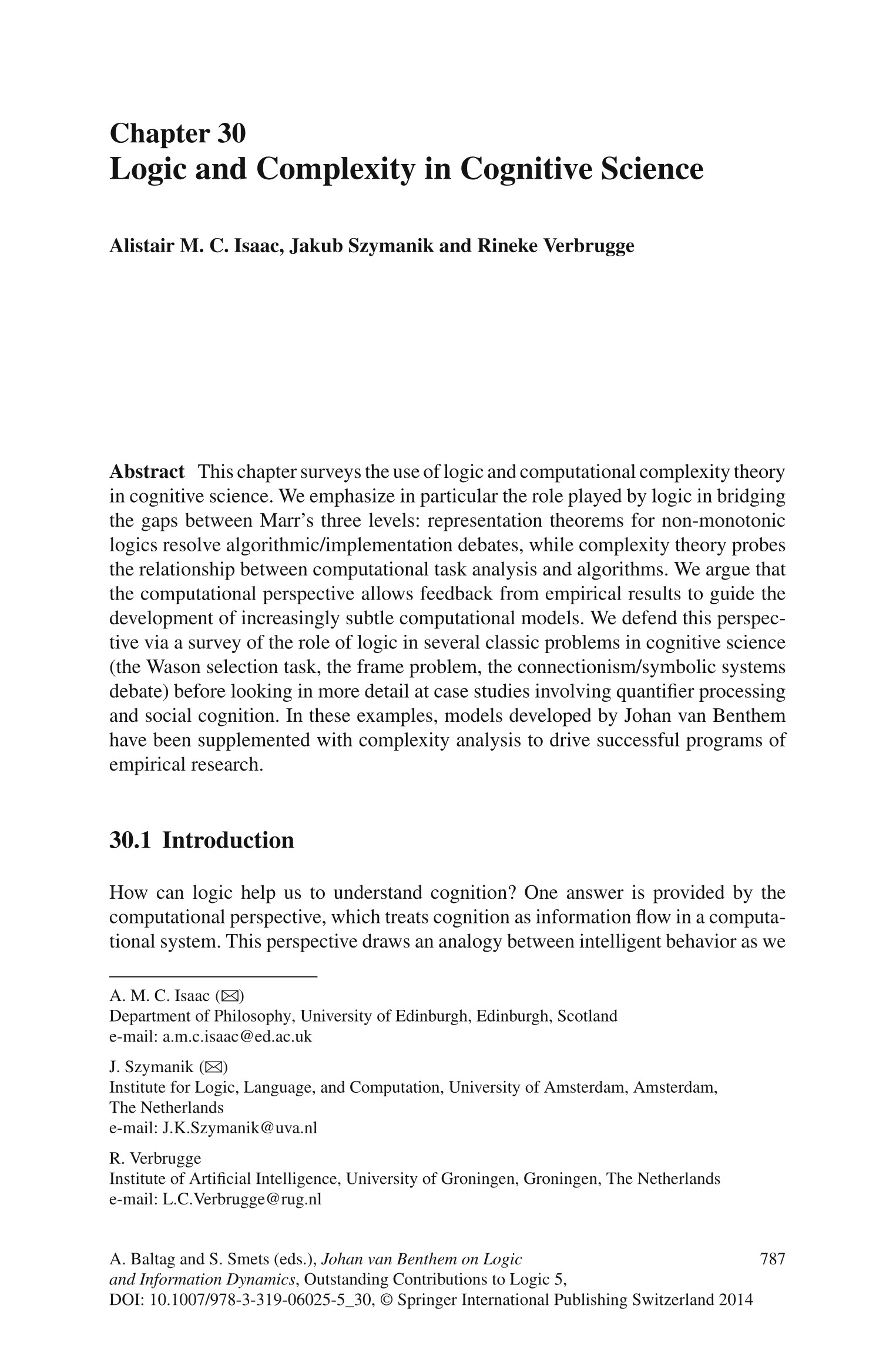 |
| This chapter surveys the use of logic and computational complexity theory in cognitive science. We emphasize in particular the role played by logic in bridging the gaps between Marr’s three levels: representation theorems for non-monotonic logics resolve algorithmic/implementation debates, while complexity theory probes the relationship between computational task analysis and algorithms. |
|
|
Searching for a universal constraint on the by Floris Roelofsen and Wateru Uegaki |
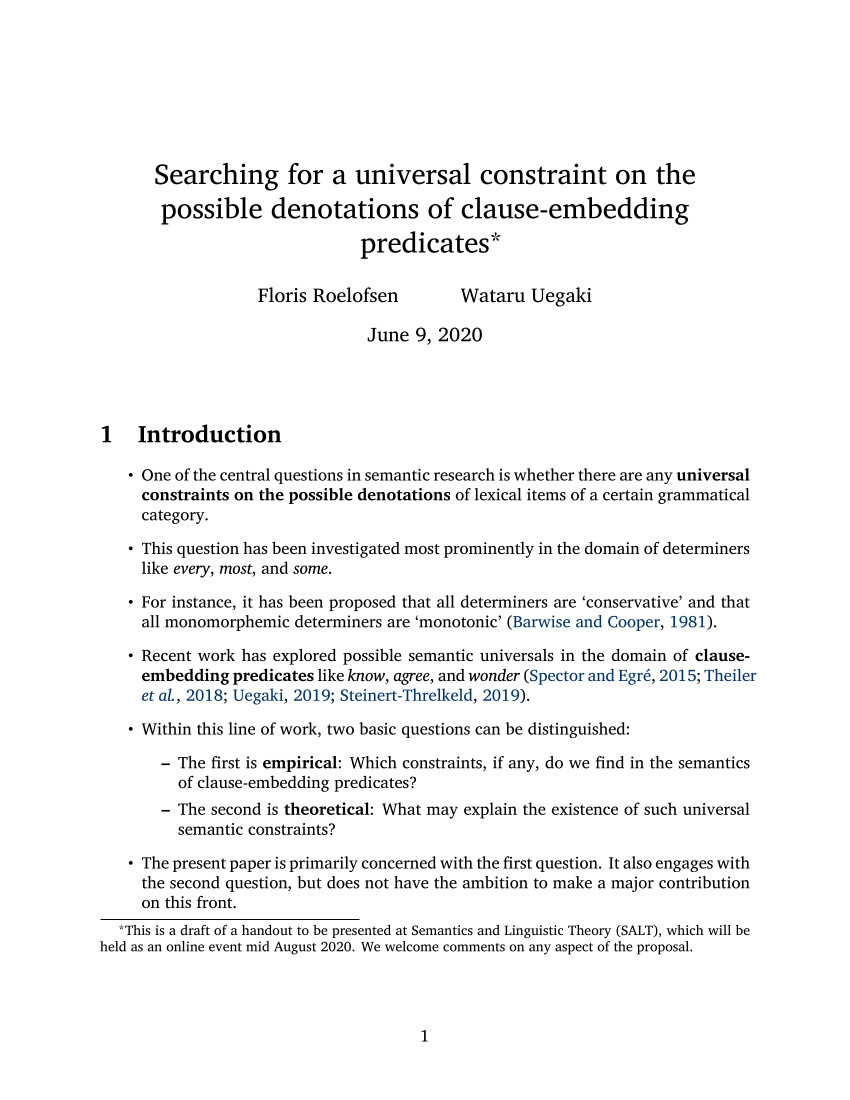 |
|
This is a draft of a handout to be presented at the 30th Semantics and Linguistic Theory (SALT), which will be held as an online event mid August 2020.
|
|
|
Ivan Titov currently executes an ERC Starting grant at UoE and an NWO VIDI‐grant at UvA |
|
|
BROADSEM: Induction of Broad-Coverage Semantic Parsers BroadSem is a research project hosted at the University of Edinburgh and University of Amsterdam and led by Ivan Titov. The project is supported by an ERC starting grant (678254). The key bottleneck for natural language processing is the lack of accurate methods for producing meaning representations of texts and reasoning with these representations. BroadSem aims at addressing these shortcoming by providing effective methods for semantic parsing, relying deep generative modeling, and developing methods for incorporating meaning representations in downstream applications (e.g., machine translation and question answering). Scaling Semantic Parsing to Unrestricted Domains Computers extracting knowledge from text would revolutionize search engines and other web applications. The current manually created sources are not sufficient to extract knowledge from texts on the web. How can computers understand text by reading it? This is the main challenge within this project. |
|
|
|
|
|
Evolution of Shared Semantics in Computational Environments "In everyday life, humans exhibit strong skills in resolving communication problems by re-negotiating what they QT21: Quality Translation 21 A European Digital Single Market free of barriers, including language barriers, is a stated EU objective to be achieved by 2020. The findings of the META-NET Language White Papers show that currently only 3 of the EU-27 languages enjoy moderate to good support by our machine translation technologies, with either weak (at best fragmentary) or no support for the vast majority of the EU-27 languages. This lack is a key obstacle impeding the free flow of people, information and trade in the European Digital Single Market. |
Former Collaborations
|
Book |
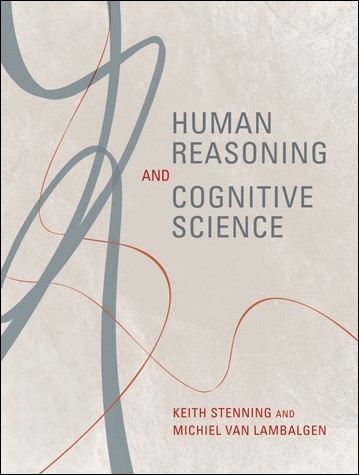 |
| In Human Reasoning and Cognitive Science, Keith Stenning and Michiel van Lambalgen—a cognitive scientist and a logician—argue for the indispensability of modern mathematical logic to the study of human reasoning. Logic and cognition were once closely connected, they write, but were “divorced” in the past century; the psychology of deduction went from being central to the cognitive revolution to being the subject of widespread skepticism about whether human reasoning really happens outside the academy. Stenning and van Lambalgen argue that logic and reasoning have been separated because of a series of unwarranted assumptions about logic. | |
|
ESPRIT Basic Research Project 6852, Dynamic Interpretation of Natural Language (DYANA) |
|
|
The Basic Research Action DYANA ("Dynamic Interpretation of Natural Language") was concerned with foundational research towards the development of an integrated computational model of language interpretation, covering the spectrum from speech to reasoning. The programme of work focuses on the following themes in natural language understanding:
|


